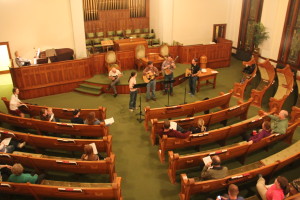This is the second part of a series reviewing three crucial commitments church members should make to their the congregation. The series introduction can be found here.
Our first commitment is to gather with the rest of the community for public worship every Lord’s Day. This is a fundamental way we fulfill our vow “to serve Christ in his church by supporting and participating with this congregation in its service of God”. What makes corporate worship so important?
Scriptural Command
 First, when we worship we obey God who commands our praise. I Chronicles 16:29 states the direction that runs throughout scripture, “Ascribe to the LORD the glory due his name; bring an offering and come before him! Worship the LORD in the splendor of holiness”.
First, when we worship we obey God who commands our praise. I Chronicles 16:29 states the direction that runs throughout scripture, “Ascribe to the LORD the glory due his name; bring an offering and come before him! Worship the LORD in the splendor of holiness”.
Moreover, the one who is worshiped determines how. Our praise of God isn’t a time of self-expression, it calls for submission and obedience. God commands us in the manner of our worship, and this includes the “when”. Worshiping God, in the way He has prescribed, is at the root of obedience to the Fourth Commandment:
Remember the Sabbath day, to keep it holy. Six days you shall labor, and do all your work, but the seventh day is a Sabbath to the LORD your God. On it you shall not do any work, you, or your son, or your daughter, your male servant, or your female servant, or your livestock, or the sojourner who is within your gates. For in six days the LORD made heaven and earth, the sea, and all that is in them, and rested on the seventh day. Therefore the LORD blessed the Sabbath day and made it holy. (Exodus 20:8-11 ESV)
We keep the Lord’s Day holy, in part, by corporate worship – gathering with God’s people to hear his Word, sing his praises, and lift up our hearts in adoration.
Gathering of the Covenant Community
Second, gathering together for worship, as are all of God’s commands, is for our benefit. We can’t be God-centered without being other-encompassed. As T.S. Eliot wrote in “Choruses from the Rock”:
What life have you, if you have not life together?
There is no life that is not in community,
And no community not lived in praise of GOD.
Gathering together encourages us as we remember our identity as God’s redeemed and embraced children. It reorients us within the body and towards our Head. As Hebrews instructs, “And let us consider how to stir up one another to love and good works, not neglecting to meet together, as is the habit of some, but encouraging one another, and all the more as you see the Day drawing near.” (Hebrews 10:24-25 ESV)
 A cliché sometimes heard by those who frequently neglect common worship is that they can worship God just as well on the golf course, or on the lake, or ball field – or whatever else we allow to take priority over worshiping God with our fellow believers. But if worship is rightly understood, you can’t. You might feel close to God, you might think about Him, you might even feel inspired by the majesty of creation. But you can’t really worship as God has taught us because you can’t encourage and be encouraged by other believers, you can’t gather around the Lord’s table to receive the supper, you can’t promise a new believer your support as they are baptized, and you can’t sit under the proclaimed Word. Christian worship is fundamentally communal. This isn’t about being in a particularly holy place, but in the midst of a particular people – “the Kingdom of God is within you”.1 As many commentators have noted, the elemental prayer our savior gave us begins not with my but Our Father. Even as we pray in private, we remember that we do so as part of our new family.2 This communal nature of worship is unsurprising considering the very nature of the God we Worship. Within the essence of God, who is Holy Trinity, is a communion of persons, therefore worship is fellowship with God the Father, through the Son, in the power of the Holy Spirit.
A cliché sometimes heard by those who frequently neglect common worship is that they can worship God just as well on the golf course, or on the lake, or ball field – or whatever else we allow to take priority over worshiping God with our fellow believers. But if worship is rightly understood, you can’t. You might feel close to God, you might think about Him, you might even feel inspired by the majesty of creation. But you can’t really worship as God has taught us because you can’t encourage and be encouraged by other believers, you can’t gather around the Lord’s table to receive the supper, you can’t promise a new believer your support as they are baptized, and you can’t sit under the proclaimed Word. Christian worship is fundamentally communal. This isn’t about being in a particularly holy place, but in the midst of a particular people – “the Kingdom of God is within you”.1 As many commentators have noted, the elemental prayer our savior gave us begins not with my but Our Father. Even as we pray in private, we remember that we do so as part of our new family.2 This communal nature of worship is unsurprising considering the very nature of the God we Worship. Within the essence of God, who is Holy Trinity, is a communion of persons, therefore worship is fellowship with God the Father, through the Son, in the power of the Holy Spirit.
What do I get out of it?
As we worship, we receive. Caution is needed though, because there is a tendency for us to approach worship asking, “What do I get out of it?”. The danger with that question is that it reveals a consumer’s attitude. The question could be rephrased as “Do I enjoy the music?”, “Do I like being with the people?”, or “Do I feel good about the sermon?” In these of questions we approach worship with self-diagnosed needs and our own benchmarks. This is a shopper’s approach, browsing for an inspirational feeling, wisdom to fix a problem, or an assuaging of guilt.
To receive as a disciple is to trust that the Master knows better than us and to accept what he offers: commands that I would rather ignore, conviction of sin that I have been suppressing, and humbling assurance of forgiveness. These are things we will miss if we basing the question on our musical taste or how funny the preacher is. What we “get out of” worship is God’s Word spoken to us and his gracious promises confirmed in water, bread, and wine. We receive welcome and fellowship within a community that God calls his own. We receive nothing less that God himself.
1. Luke 17:21, The “you” is second person plural. Jesus is not saying that the Kingdom is and individualistic, internal reality.↩
2. Eliot is helpful here as well, “Choruses from the Rock” continue, “Even the anchorite who meditates alone,/ For whom the days and nights repeat the praise of GOD,/ Prays for the Church, the Body of Christ incarnate. ↩


 Second: It doesn’t take the institution of the church to be a “Christian” activity. Obviously, gathering together with the saints for worship requires the church. And while we need Christians to support and serve in the congregation. Loving your neighbor doesn’t require the approval of the board of elders. Sharing God’s grace and love doesn’t require a committee. This should be obvious, but as a Pastor I am too aware of my own tendency to think of needs in the church as examples of Christian service: teaching a bible class, helping with the nursery, cleaning the church kitchen, or preparing a budget. These are of course needed. But leading your family in prayer and bible study, sharing a meal with a lonely neighbor, or mentoring a child at the Boys and Girls Club is no less Christian. So as we look at these three ways Christians should be involved with their local congregation, keep in mind that this doesn’t exhaust all of what discipleship means. There are other personal and family disciplines and commitments, but I’m only discussing those related to obligations to the local congregation. Also, while members should be involved in the ministry and work of the church, one’s Church involvement shouldn’t take so much time and energy that there is none left to give to your family, neighbors, and community. Salt is meant to add flavor to food, not to more salt. Light is to shine in the darkness, not illumine a bright room.
Second: It doesn’t take the institution of the church to be a “Christian” activity. Obviously, gathering together with the saints for worship requires the church. And while we need Christians to support and serve in the congregation. Loving your neighbor doesn’t require the approval of the board of elders. Sharing God’s grace and love doesn’t require a committee. This should be obvious, but as a Pastor I am too aware of my own tendency to think of needs in the church as examples of Christian service: teaching a bible class, helping with the nursery, cleaning the church kitchen, or preparing a budget. These are of course needed. But leading your family in prayer and bible study, sharing a meal with a lonely neighbor, or mentoring a child at the Boys and Girls Club is no less Christian. So as we look at these three ways Christians should be involved with their local congregation, keep in mind that this doesn’t exhaust all of what discipleship means. There are other personal and family disciplines and commitments, but I’m only discussing those related to obligations to the local congregation. Also, while members should be involved in the ministry and work of the church, one’s Church involvement shouldn’t take so much time and energy that there is none left to give to your family, neighbors, and community. Salt is meant to add flavor to food, not to more salt. Light is to shine in the darkness, not illumine a bright room.
